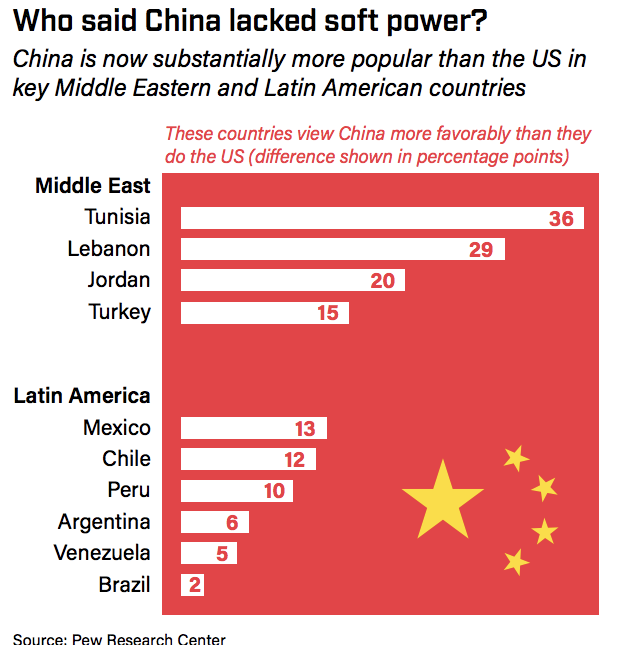.jpg) Markets are soaring. The economy is doing fine. And yet, 2018 doesn ’t feel good.
Markets are soaring. The economy is doing fine. And yet, 2018 doesn ’t feel good.Despite entering the new year with a positive financial outlook, we could see one wrong move ignite geopolitical chaos. “The global order is unravelling,” says Eurasia Group president Ian Bremmer and chairman Cliff Kupchan. This year ’s Top Risks report from his organisation doesn ’t sugar-coat any of its projections. “If we had to pick one year for a big unexpected crisis—the geopolitical equivalent of the 2008 financial meltdown—it feels like 2018,” say Bremmer and Kupchan. “Sorry.”
On course for a geopolitical depression, the world order is fracturing from blows to the legitimacy of liberal democracies, declining US influence and the consequent vacuum, a rise in protectionism, and competition for tech dominance. Without a hegemon to establish a new order, the geopolitical environment presents a much greater risk than the markets currently suggest. “You have this unusual situation where risks are really elevated and exceptionally dangerous, yet the economy continues chugging along,” says Bremmer.
Here are Eurasia ’s highlighted top-ten risks to look out for in 2018: China loves a vacuum China is coming to power at the same moment that the US experiences its weakest leadership in modern history. In a shifting world order, the protectionist retreat highlighted by Trump ’s “America First” mantra has created a power vacuum just when President Xi Jinping ’s China finds itself in the strongest geopolitical position of any Chinese leader since Mao. This creates several almost unprecedented risks: The global business environment will have to adjust to entirely new standards, which will raise the cost of doing business Asian geopolitics will be polarised between the US and China ’s regional allies Xi ’s increasing control could pose a threat to China ’s long-term economic trajectory
 Accidents This risk is all about the potential for mistakes. Cyberattacks, war with North Korea, terrorist attacks, US-Russia relations, and the war in Syria all have the potential to drive a wedge into geopolitical stability. It ’s impossible to predict that an ‘accident ’ will happen, but with geopolitical risks continuing to proliferate, the odds that missteps can be avoided become ever weaker.
Accidents This risk is all about the potential for mistakes. Cyberattacks, war with North Korea, terrorist attacks, US-Russia relations, and the war in Syria all have the potential to drive a wedge into geopolitical stability. It ’s impossible to predict that an ‘accident ’ will happen, but with geopolitical risks continuing to proliferate, the odds that missteps can be avoided become ever weaker..jpg)
click to enlarge
The vast economic potential brought by emerging technologies will instigate 2018 ’s biggest power struggle, particularly with the emergence of next-generation technologies like AI and super-computing. “That revolution is happening in two countries: The US and China,” says Bremmer. “This is a fight between two very different models, and increasingly a fight that either one could win.” For now, the US still has the best talent, but China is pouring resources into closing the lead. They ’ll also continue to struggle for market dominance as both compete to be the top technology supplier in areas of civilian infrastructure, consumer goods, and government procurement and security equipment. Decreased potential for cooperation between the two countries in other arenas compounds the risk.
.jpg)
click to enlarge
4. Mexico
.jpg)
click to enlarge
Trump has big plans for Iran: minimising Iran ’s regional influence through stronger support for Saudi Arabia; increased sanctions; and as seen recently, public support for anti-government protesters. Tensions across the region will be exacerbated by a retaliatory Iran, which will spell trouble for investors. Eurasia group cautiously projects that the nuclear deal will last through the year. “It ’s a hell of a close call,” says Kupchan. If it doesn ’t, it ’s likely that Iran would grow its nuclear program, which would increase the threat of US or Israeli strikes on the country and consequently boost oil prices.
.jpg)
click to enlarge
6. The erosion of institutions
.jpg)
click to enlarge
.jpg)
click to enlarge
8. United Kingdom
Brexit woes won ’t go away for the UK anytime soon. Fighting over details of the negotiations will continue seemingly endlessly. If Prime Minister Theresa May loses her job in the process, she ’ll likely be replaced by a Tory hardliner, but if Jeremy Corbyn pulls a surprise and wins a new election, both Article 50 talks and domestic economic policy will suffer.
.jpg)
click to enlarge
The identity politics prominent in the US and Europe has infected southern Asia, too. The strains present in Southeast Asia and the Indian sub-continent are primarily Islamism, anti-Chinese and other minorities, and growing Indian nationalism. In Indonesia and Malaysia especially, the majority Muslim population is emboldened by fears of perceived injustice. Across the region, resentment is once again rising against ethnic Chinese in response to their often-disproportionate share of wealth. In India, there ’s fear that Prime Minister Narenda Modi will stoke Hindu nationalism ahead of 2019 elections and provide a cover for radicalised factions of society.
.jpg)
10. Africa ’s security
.jpg)
click to enlarge
BGC Insurance Group continues aviation ramp-up
Another Marsh JLT Speciality flies out
Barbican Protect names professional indemnity head in London
Key recruit "will undoubtedly help to boost our standing"
This week's top jobs in insurance – August 05, 2019
Here are career opportunities, from underwriting to coaching
Yorumlar
Yorum Gönder